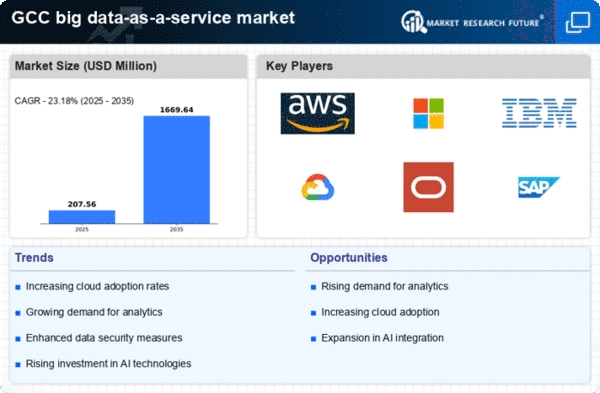Growing Focus on Cost Efficiency
Organizations in the GCC are increasingly prioritizing cost efficiency, which is driving the adoption of big data-as-a-service solutions. By outsourcing data management and analytics to service providers, companies can reduce operational costs associated with maintaining in-house infrastructure. This shift is particularly appealing to small and medium-sized enterprises (SMEs) that may lack the resources to invest in extensive data capabilities. The big data-as-a-service market offers scalable solutions that allow businesses to pay only for the services they use, thereby optimizing their budgets. As a result, the market is likely to see continued growth as more organizations seek to enhance their data capabilities without incurring significant upfront costs.
Expansion of Internet of Things (IoT)
The proliferation of Internet of Things (IoT) devices in the GCC is significantly influencing the big data-as-a-service market. As more devices become interconnected, the volume of data generated is increasing exponentially. This surge in data necessitates robust analytics solutions to process and derive meaningful insights. The GCC region is witnessing a rapid increase in IoT adoption, with estimates suggesting that the number of connected devices could reach 50 billion by 2030. Consequently, businesses are turning to big data-as-a-service offerings to manage and analyze this vast amount of data effectively, thereby enhancing operational efficiency and driving innovation.
Government Initiatives and Investments
Government initiatives aimed at fostering digital transformation in the GCC are playing a crucial role in the growth of the big data-as-a-service market. Various governments in the region are investing heavily in smart city projects and digital infrastructure, which inherently rely on data analytics. For instance, the UAE government has launched several initiatives to promote data-driven governance and enhance public services through technology. These investments are expected to create a favorable environment for big data-as-a-service providers, as public and private sectors increasingly collaborate to leverage data for improved service delivery and economic growth.
Rising Demand for Data-Driven Insights
The big data-as-a-service market is experiencing a notable surge in demand for data-driven insights across various sectors in the GCC. Organizations are increasingly recognizing the value of leveraging data analytics to enhance decision-making processes. This trend is particularly evident in industries such as retail and finance, where data insights can lead to improved customer experiences and operational efficiencies. According to recent estimates, the market for data analytics in the GCC is projected to grow at a CAGR of approximately 25% over the next five years. This growing appetite for actionable insights is driving investments in big data-as-a-service solutions, as companies seek to harness the power of data to gain a competitive edge.
Emergence of Advanced Machine Learning Techniques
The emergence of advanced machine learning techniques is reshaping the landscape of the big data-as-a-service market. As organizations in the GCC seek to extract deeper insights from their data, the integration of machine learning algorithms into big data solutions is becoming increasingly prevalent. These techniques enable businesses to identify patterns and trends that were previously difficult to discern, thereby enhancing predictive analytics capabilities. The market for machine learning in the GCC is expected to grow substantially, with projections indicating a potential increase of over 30% in the next few years. This trend is likely to drive demand for big data-as-a-service offerings that incorporate sophisticated machine learning functionalities.
















